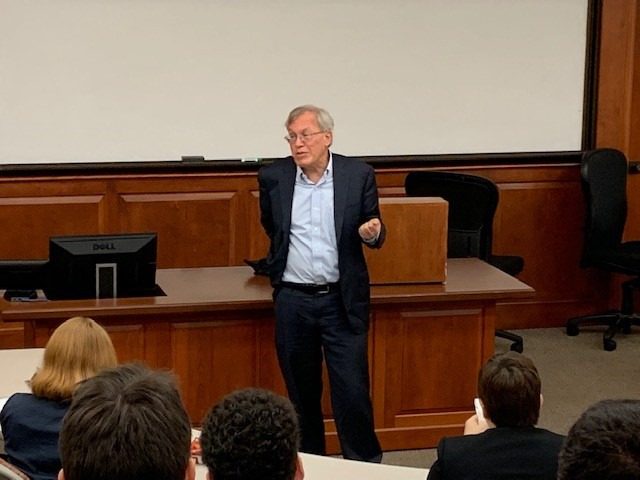Friday, Sept. 13, six international panelists convened at the College of William and Mary’s Marshall-Wythe School of Law to speak about constitutions and democracy. The event was entitled, “Rethinking Constitutions When Democracy is Under Siege: A Global Perspective” and was supported by the Wendy and Emery Reves Center for International Studies.
The panelists spoke on a variety of topics related to the theme including constitutional challenges in West Africa, Latin American perspectives on presidential powers and protests in Hong Kong.
Moderator Christie Warren said that she had been working on organizing the event for a year, and she looked specifically for panelists who would provide a global perspective to the event.
“You know we read in the media different reports from different news sources, but to actually get people together and talk about what is actually happening in the streets in Parliament and in the executive branches is invaluable.”
“We gathered together a group of experts from different regions of the world to discuss and compare similar events that are going on in Latin America, and Asia, and Africa and Europe and in the United States,” Warren said. “You know we read in the media different reports from different news sources, but to actually get people together and talk about what is actually happening in the streets in Parliament and in the executive branches is invaluable.”
Co-Director of the Comparative Constitutions Project Zachary Elkins spoke about presidential powers in Latin America. He provided comparisons between Latin American countries with regard to executive powers granted in their constitutions, term limits, how often their constitutions were changed and how similar they were to the U.S. Constitution.
Elkins said that democratic countries often struggled to encourage public audiences to participate in constitutional revisions. However, using Cuba as a case study, Elkins showed that authoritarian settings may be more successful in obtaining public input on constitutional changes. He said that Cuba’s constitution was changed to include more liberal elements like gay marriage after the public was involved in the revision processes.
“Cuba often seems like a living museum almost — very little has changed,” Elkins said. “But interestingly enough, constitutionally, they’ve had a new constitution every 15 to 20 years.”
Delving into term limits for executives and examining how these stipulations are often evaded by power-hungry politicians, Elkins reasoned that it is essential to build nondemocratic elements into democratic constitutions. He said that fighting fire with fire by banning parties, militaristic assemblies and fascist politics in constitutions appears nondemocratic but is necessary in order to preserve democracy.
“When a president tries to evade term limits, it sets this cycle of law breaking in action,” Elkins said.
University of California Irvine School of Law Chancellor’s Professor David Law spoke next. He first laid out the history of protests in Hong Kong for his talk entitled, “Hong Kong and Constitutional Inertia in Asia.” Law then spoke to the complicated arrangement between Hong Kong and the People’s Republic of China and how the recent protests in Hong Kong began.
Protests broke out in Hong Kong in response to an extradition bill that, according to Law, Hong Kong Chief Executive Carrie Lam pushed under the pretext of needing to extradite a criminal from Thailand to the PRC. Law said that the PRC approved of the bill but did not push for it. However, they will do anything to avoid losing face now that the protesters are pushing back.
Law then explained how the government’s refusal to compromise with the protesters has resulted in radicalized, leaderless protest. He said that the protests have created an “us versus them” mentality, with the police force and the justice system on one side focusing on protester violence — but ignoring the violence displayed by the police.
“This is an island of refugees,” Law said. “Most of the population fled the communist revolution and others came from other parts of the world. So, this is a place of refugees; they value their freedom. That’s what they went there for and they are scared that those freedoms are being eroded and undermined by Beijing, and even in the case of the extradition law, proactively by their own government, because small minded people with ambition have every incentive to try to anticipate and cater to the needs of Beijing and not to the people.”
After Law spoke, two students raised questions about how Law characterized the conflict between protesters and police in Hong Kong. These students took issue with Law focusing on the police violence towards protesters and less on the protester violence toward police. Law responded that the violent protesters were being prosecuted and that he did not believe that they needed to be so concerned about protesters being punished. Law said that this interaction exemplified the discourse taking place in Hong Kong right now, and that he would spend as long as it takes to explain to these students that protesters were being mistreated.
One of the students who raised these questions, Thomas Cao J.D. ’20, said that he questioned Law about his views because he thought the information presented only told one side of the story.
“I think that the lecturer may have a little bit of a stereotyped view of mainland China,” Cao said. “So, I want to talk about or point out some other sides of the Hong Kong protest.”
Warren said that this kind of engaged discussion is supported and encouraged by the symposium.
“I mean we’re not here to preach one viewpoint. This is an academic institution we value debate and discussion. Academic institutions are where debate should happen in my opinion.”
“I think that’s a natural part of debate,” Warren said. “I mean we’re not here to preach one viewpoint. This is an academic institution we value debate and discussion. Academic institutions are where debate should happen in my opinion.”




































